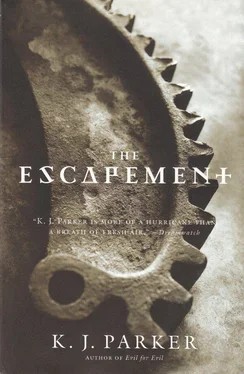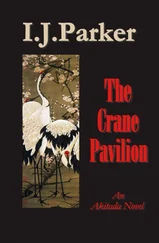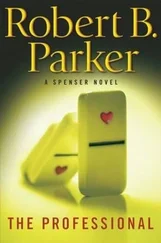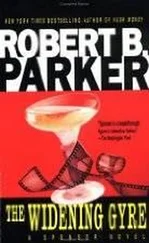K Parker - The Escapement
Здесь есть возможность читать онлайн «K Parker - The Escapement» весь текст электронной книги совершенно бесплатно (целиком полную версию без сокращений). В некоторых случаях можно слушать аудио, скачать через торрент в формате fb2 и присутствует краткое содержание. Жанр: Фэнтези, на английском языке. Описание произведения, (предисловие) а так же отзывы посетителей доступны на портале библиотеки ЛибКат.
- Название:The Escapement
- Автор:
- Жанр:
- Год:неизвестен
- ISBN:нет данных
- Рейтинг книги:4 / 5. Голосов: 1
-
Избранное:Добавить в избранное
- Отзывы:
-
Ваша оценка:
- 80
- 1
- 2
- 3
- 4
- 5
The Escapement: краткое содержание, описание и аннотация
Предлагаем к чтению аннотацию, описание, краткое содержание или предисловие (зависит от того, что написал сам автор книги «The Escapement»). Если вы не нашли необходимую информацию о книге — напишите в комментариях, мы постараемся отыскать её.
The Escapement — читать онлайн бесплатно полную книгу (весь текст) целиком
Ниже представлен текст книги, разбитый по страницам. Система сохранения места последней прочитанной страницы, позволяет с удобством читать онлайн бесплатно книгу «The Escapement», без необходимости каждый раз заново искать на чём Вы остановились. Поставьте закладку, и сможете в любой момент перейти на страницу, на которой закончили чтение.
Интервал:
Закладка:
K J Parker
The Escapement
1
"The quickest way to a man's heart," the instructor said, "is proverbially through his stomach, but if you want to get into his brain, I recommend the eye socket."
He reached out with the tip of the rapier and tapped it against the signet ring he'd hung by a strand of cotton from the arm of the ornate gilt lamp bracket. The ring began to sway slowly backwards and forwards, like a pendulum. He took a step back, then raised the sword again, and slid his front foot smoothly across the tiles as he lunged. The point of the rapier tinkled against the ring as it passed through its centre.
"That's very good," Psellus said. "I don't think I'll be able to do that."
The instructor nodded. "Not to begin with," he said. "You've got to work up to it. But try it anyway."
Psellus frowned, then nodded. "You never know," he said. He closed his hand around the grip of his rapier. ("That's it. Imagine you're holding a mouse; tight enough to stop it escaping, but don't crush its ribs.") He felt a stabbing pain in the overworked tendons of his elbow as he raised his hand into the third guard, and knew he'd regret all this later. Twenty years holding nothing heavier than a pen, and now he would insist on learning to fence.
"Just look at the ring," the instructor said. "Forget about the sword, just the ring."
Psellus felt his muscles tense, which was quite wrong, of course.
He'd been told about that, and it had made sense and he'd understood, but for some reason he couldn't stop himself doing it. That was what came of fifty years of imagining what it'd be like to fence with a real sword.
"When you're ready," the instructor sighed.
That meant, get on with it, freely translated from the diplomatic; so he snatched a half-mouthful of breath, fixed all his attention on the tip of the sword and prodded desperately at the ring. The rapier point missed it by a handspan, glanced off the base of the bracket and gouged a small chip of plaster out of the wall.
"Not quite there yet," the instructor said, in a very calm voice. "You'd have taken a chunk out of his ear, but that'd probably just make him hate you. Now then."
Psellus lowered the sword until the tip rested on the tiles. It was hopeless, he reckoned. For one thing, they'd given him a sword that was far too heavy. You couldn't expect to be able to do fine work with a great big heavy thing, it'd be like trying to write with a scaffolding pole. He'd mentioned this several times but the instructor had politely ignored him.
"It's basically the same idea as everything else we've covered so far," the instructor was saying. "You start off slow and easy, just leaning gently forward and putting the point in the ring; and when you've done that a thousand times or so, you can gradually pick up speed and force until it's right. So, as slow as you like, lift the sword and just point at the ring, like you're pointing with your finger."
Ten times (which meant only nine hundred and ninety to go), and then Psellus said, "I'm sorry, I think I'll have to stop now, my elbow's hurting rather a lot. Perhaps we can try again tomorrow, if that would be convenient for you."
"Of course." The instructor reached out and tugged the ring off the cotton, which dangled like a strand of dusty cobweb. "If you can possibly make time to practise before then, I think you'll find it very useful."
He put his rapier back in its case, buckled up the strap, bowed ever so politely and left. When he'd gone, Psellus walked slowly back to his desk and sat in his chair for a while, unable to think about anything much apart from the pain in his elbow. So much for fencing. It would have been nice to be able to do it; and now that he was the chairman of Necessary Evil, in effect the supreme ruler of the City, he'd assumed that the ability would somehow have come to him, as part of the package. Rulers, princes could do that sort of thing; they could fence and ride and shoot and dance minuets and fly hawks and sing serenades while accompanying themselves on the rebec or psaltery, because those sorts of thing were what princes did; you never heard or read about a prince who couldn't hunt or sword-fight, so obviously there was some kind of basic connection between the job and the ability. But maybe it didn't apply to chairmen, or maybe there was rather more to it than that. Still, at least he was trying; and perhaps nine hundred and ninety more tentative jabs with the very heavy sword would turn him into what everybody seemed to think he was these days. Or maybe not.
The truth is, he thought as he reached across his desk and uncapped his inkwell, I seek to make myself ridiculous, because I know I shouldn't be here. A pretender (the perfect word; ever since it had occurred to him, he'd been hugging it to himself like a child's toy) ought to have ridiculous pretensions, such as fencing, riding, archery, dance, falconry, all of which he's hopeless at, and that's how the people come to realise he's not the true prince. Tomorrow, if there's time, I must find someone to teach me how to dance. It's practically my duty.
If there's time. He looked down at his desk. If he was really a prince, someone else would be reading all these reports for him, and he'd have all the time in the world. He'd have a chancellor or a grand vizier, either bald and enormously fat or long, dark and saturnine, discreetly running the empire while His Imperial Highness rode to hounds or recited poetry to beautiful, empty-headed young women.
He lifted his head to look out of the window, and thought about his enemy. Duke Valens was reckoned to be the finest huntsman in the world, so clearly he was a proper prince. It should have followed, therefore, that Valens was a pinhead, the natural quarry of clever, austere predators like himself. But maybe Valens wasn't a proper prince either; too intelligent, or else how had it come about that he was bearing down on the City at the head of an army of a million savages, while the ruler of the Perpetual Republic flounced and panted up and down a chalk line, trying to master the rudiments of the low guard?
Perhaps, he thought, that's why I want to be able to fence and dance and hunt and compose pastoral eclogues in trochaic pentameters; because I secretly believe that these accomplishments will turn me into someone who can also command armies and fight battles, and save my city from the million savages. Quite possibly there's a grain of sense in that, except that I've left it far too late to start learning all that stuff now. Somewhere he'd read that in order to fight your enemy, you had to understand him; more than that, you had to become him. It had struck him as extremely profound at the time, although something a little less inspirational and a little more practical would've been even better; how to run an efficient commissariat, for example, or the basics of fortifying against artillery.
That was, of course, the problem. The Perpetual Republic had a complete monopoly of all skills, trades, sciences and crafts, except one; it had no idea how to fight a war. There hadn't been any need; not until now, when mercenaries refused to sign up for fear of the Cure Hardy and the murderous field artillery designed and built by the defector Ziani Vaatzes. So, quite unexpectedly, and far too late in life, the citizens of the Republic were straining themselves trying to learn to be soldiers, as improbable and ill-fated an enterprise as Lucao Psellus learning the smallsword, the stock and the case of rapiers. Hopeless, of course; the sheer helplessness of the situation was apparent from the fact that Guild politics had practically ground to a halt. Suddenly, nobody wanted to run or be in charge of anything, there was no opposition, no factions; just a blind, desperate consensus of goodwill, support and pitiful enthusiasm, led by the unwilling ignorant under the supreme authority of a jumped-up clerk.
Читать дальшеИнтервал:
Закладка:
Похожие книги на «The Escapement»
Представляем Вашему вниманию похожие книги на «The Escapement» списком для выбора. Мы отобрали схожую по названию и смыслу литературу в надежде предоставить читателям больше вариантов отыскать новые, интересные, ещё непрочитанные произведения.
Обсуждение, отзывы о книге «The Escapement» и просто собственные мнения читателей. Оставьте ваши комментарии, напишите, что Вы думаете о произведении, его смысле или главных героях. Укажите что конкретно понравилось, а что нет, и почему Вы так считаете.












